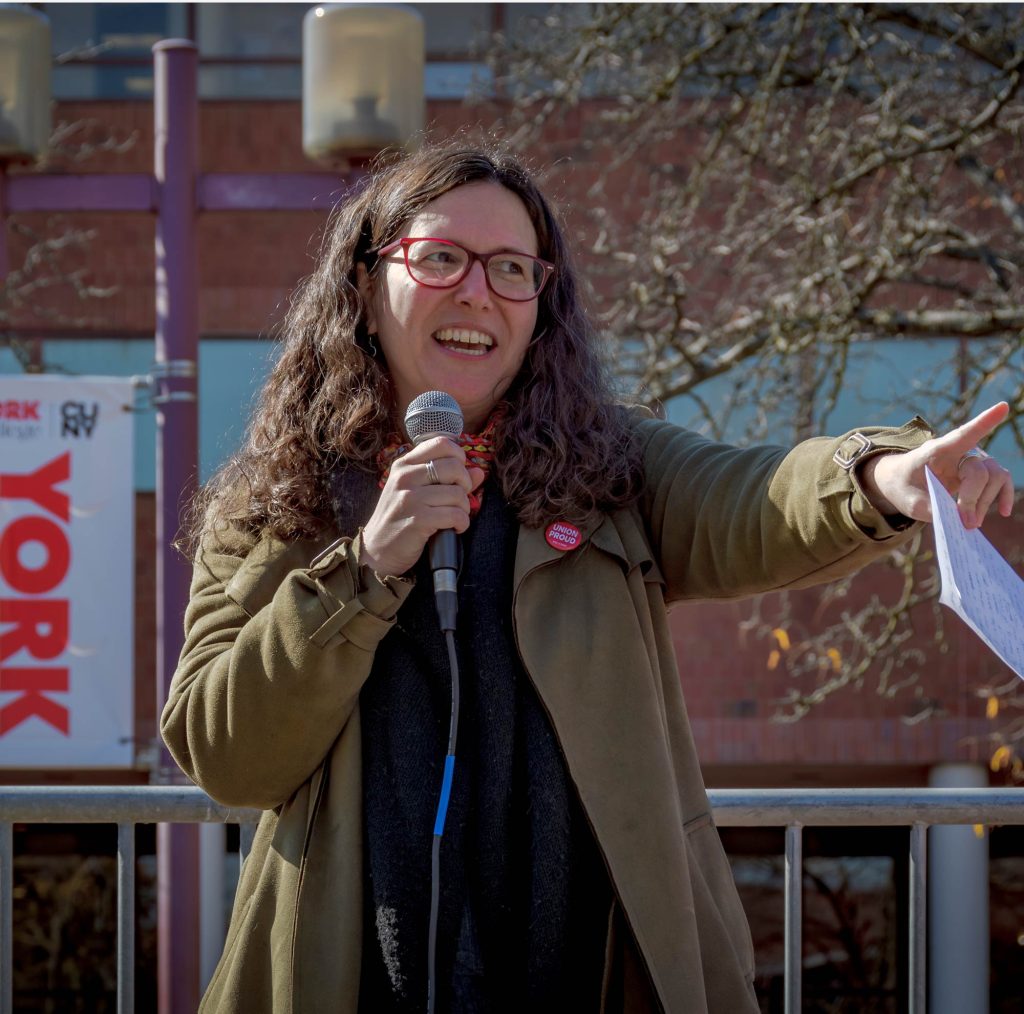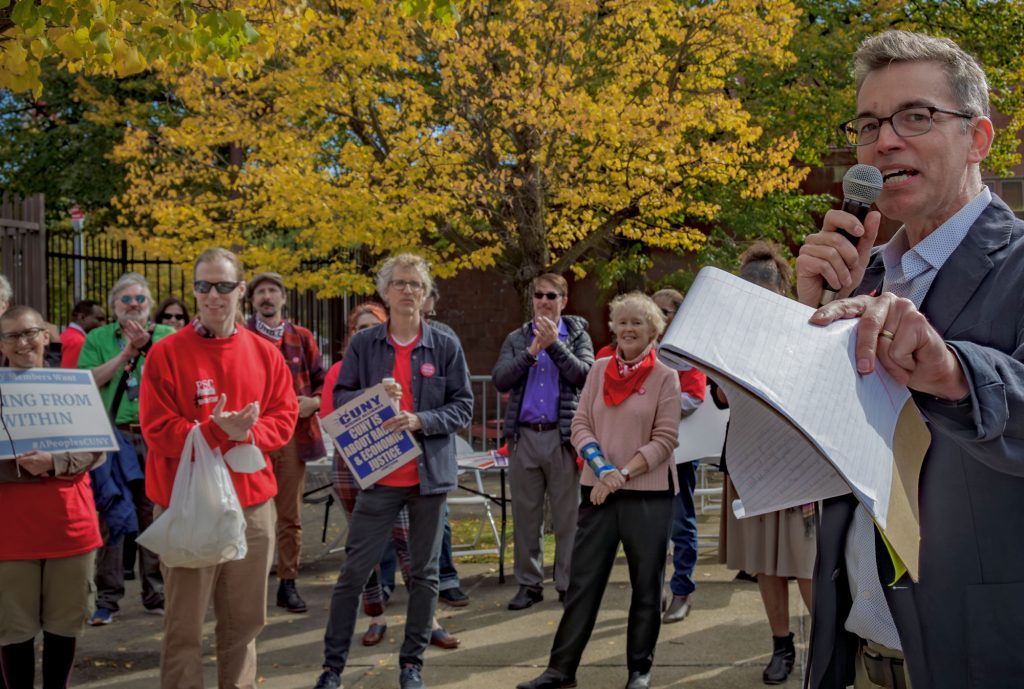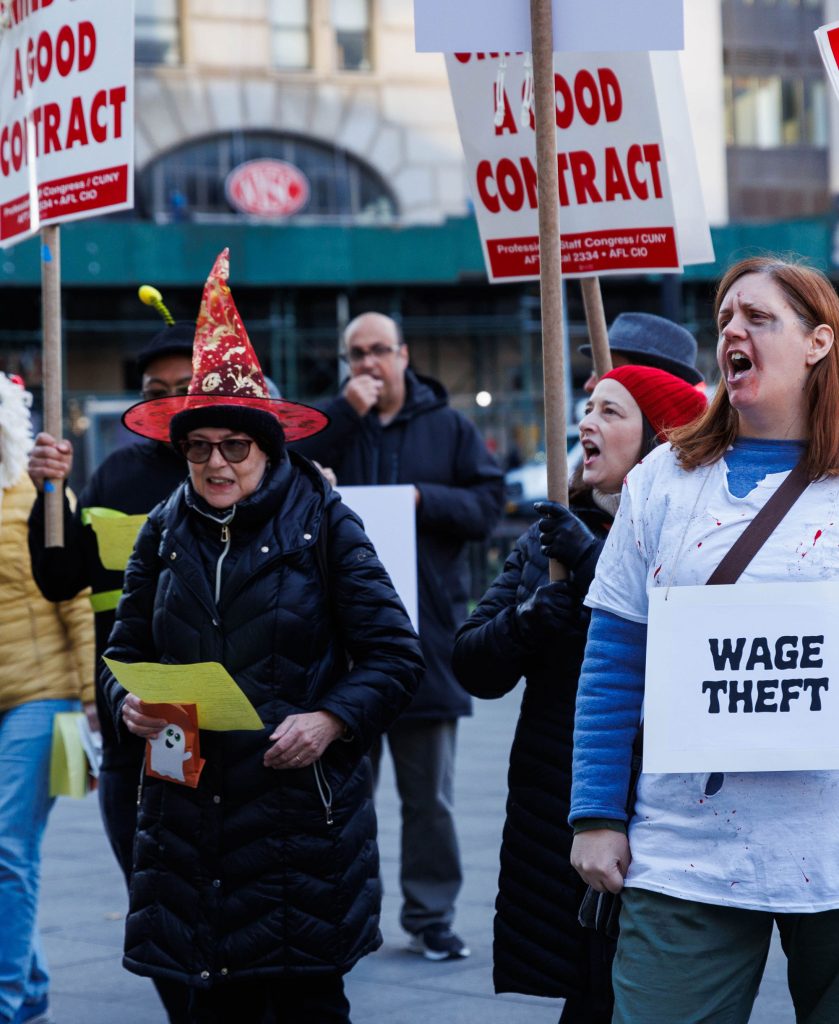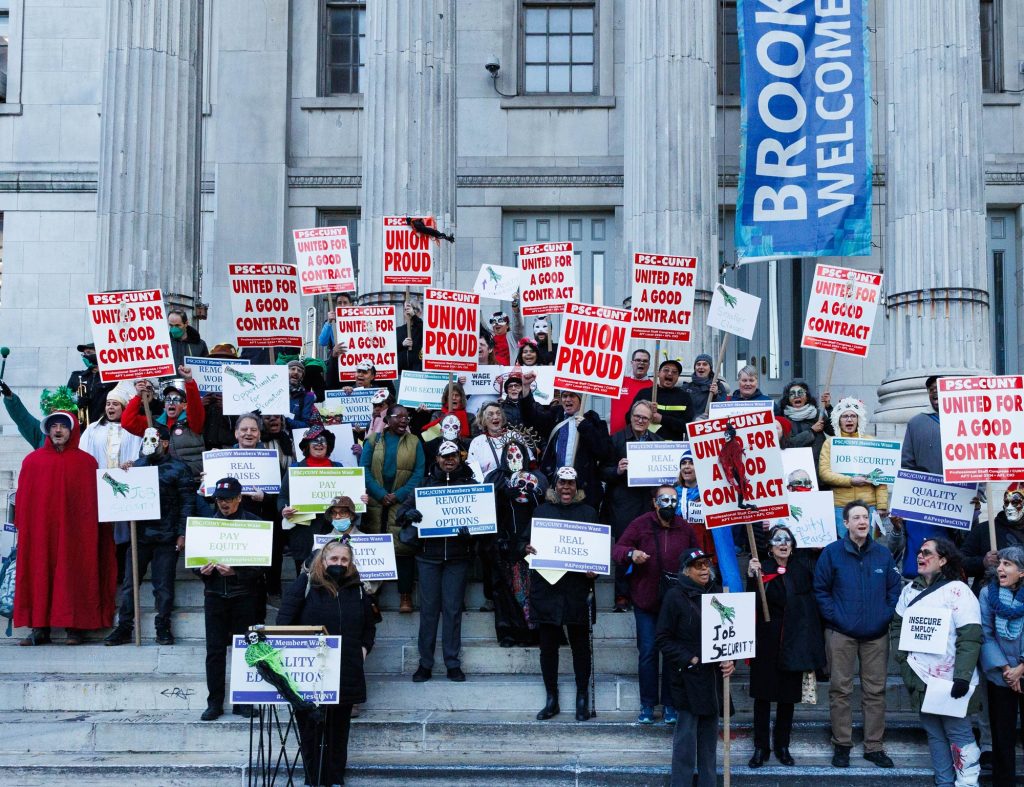
Karen Weingarten: Don’t believe CUNY’s cries of poverty. (photo credit: Erik McGregor)
More than 20 speakers from CUNY campuses in Queens participated in a speak-out action to bring awareness to issues including unsanitary working conditions, a lack of funding for faculty and staff positions, and a failure by CUNY Central to advocate for critical city and state funding for the University. Those coming together to raise awareness included full-time faculty, higher education officers, college laboratory technicians, students, lecturers and part-time faculty.
Speaking to a lunchtime crowd at York College on October 24, Ian Hansen, the York PSC chapter chair, said that during the latest round of contract negotiations, the administration was “pulling the austerity argument yet again – and yet again, we’re not buying it.”
CUNY CRIES BROKE
Karen Weingarten, the PSC chapter chair at Queens College, dismissed the administration’s cries of poverty. “It’s made up,” she said. “There is no budget crisis. It’s a city and state crisis.” She added that it was the responsibility of college presidents and the CUNY administration to demand more funding from the city and state.
The event was part of the PSC’s massive citywide action plan, “5 Boroughs in 5 Weeks,” to press for a just contract and a fair allocation for CUNY in the state budget.
In Staten Island, members campaigned for their labor contract and an increase in state funding for CUNY and the College of Staten Island. Brooklyn members held a Halloween-themed protest in downtown Brooklyn, with chanting and speak-outs. The Brooklyn event featured dancing and music by the Rude Mechanical Orchestra, with members dressed in costumes presenting the horror of austerity and CUNY budget cuts.
Brooklyn City Councilmember Lincoln Restler said at the Brooklyn rally: “CUNY is the place where economic opportunity occurs, where people have a chance of actually achieving the middle class. It is because of the work that each of you do each and every day, investing in our young people, that we are achieving real change, and you all deserve real investment.”

PSC President James Davis, right, speaks at York College. (photo credit: Erik McGregor)
BRONX ACTIONS
And as this newspaper went to press, members at Bronx campuses – Lehman College, Hostos Community College and Bronx Community College – also planned to march to their respective college president’s office to demand a just contract and full funding for CUNY.
In Manhattan, the CUNY Board of Trustees cancelled its in-person meeting at City College, where the PSC had planned its main actions, but the PSC was undeterred. Thinking quickly on its feet, the union hosted a gathering at its offices at 25 Broadway. There, members offered virtual testimony to the board as their fellow members stood behind them on camera, holding PSC signs for the trustees to see.
Below are some excerpts from the testimonies PSC members delivered at the virtual board meeting and at the York College demonstration.
Money problems
I love being part of New York City, and it is my dream to be able to retire here. I turn 63 in early November. This summer, I moved into a small one-bedroom apartment, and at the end of the two-year lease, the owner has said that he would sell the apartment to me, a minor NYC real-estate miracle that would make my dream of retiring possible. But when I reflect on the facts – (a) that I do not have the benefit of intergenerational wealth (both my parents died penniless in Texas decades ago), and (b) I work at CUNY, which disrespects me by not paying me what I am worth. I don’t know how I will be able to realize this dream of buying an apartment and retiring in New York City if I stay at CUNY.
CONSTANTLY BEHIND
I have been a professor at Hunter College since 2009 (a full professor since 2011) and my checking, savings and credit card balances tell the tale of not being paid what I am worth.
I am constantly paying down the credit card balance only to run it up again with work-related expenses. The numbers simply don’t add up to get ahead in this robbing-Peter-to-pay-Paul game, much less save for a down payment on an apartment.
There is a name for this practice: It is called strip-mining idealism. The people with the power to control the budget at CUNY are balancing theirs books on our backs. You count on our idealism about the mission of CUNY to exploit our goodwill and pay the faculty paltry sums, even as we’ve watched the CUNY administration enrich itself with pay raises of $90,000 on top of already existing six-figure salaries.
This hurts CUNY students as well. Over time, the practice of exploiting faculty – at all levels – limits our ability to work with and elevate our students, who deserve our care and attention. Instead, we are forced to offer them the scraps we have left over from our constant struggle to survive within CUNY. If we, faculty at all levels, had more resources to succeed in our fields, then we would, of course, be lifting students as we climb, involving them in our research, taking them to conferences with us and connecting them to scholars at other institutions. Instead, because of your decisions, we – faculty, staff and students – keep being forced to deal with the bare minimum as you all enrich yourselves.
Jessie Daniels
Professor, Sociology
Hunter College
Used and abused
I don’t earn a living wage. My pension would not pay for my cat’s medicine, and I don’t get to the end of my working life with benefits that carry into retirement. No, when I finally collapse from exhaustion, I lose health insurance, etc.
And when I say I don’t earn a living – this semester, as with every semester, many York adjuncts weren’t paid until the third pay period.
First, the York administration blamed the New York State Department of Finance, but they must have been told to back off that one, because this Friday, they gave the excuse that it was the adjuncts’ fault, the chairs’ fault, really, everyone’s fault but theirs.
It happens every semester. It is not an accident; it’s a way of saving money so more can go into the bottomless pockets of administration. More parties. More photo ops. More international vacations.
Jillian Abbott
Adjunct Lecturer, English
York College
Put a hold on mold
On August 31, 2021, I joined over two dozen faculty and staff members who rallied outside Medgar Evers College to call out what we saw as unsanitary conditions at the school.
Hurricanes Henri and Ida damaged the campus library, compounding what was already a lowly situation. Their impact resulted in a six-month closure of the library and water damage to other parts of the campus’s footprint. Two years later, the individuals who access the library have to deal with constant mold and mildew issues. In addition to the environmental slights, those who have raised these concerns have been gaslit and stigmatized when questioning the superficial remediations. Two weeks ago, we formally raised concerns about these persistent issues with the administration, only to be met with a retort about the college’s inability to act appropriately.
Buildings, classrooms and libraries – education infrastructure – are crucial elements to learning environments. High-quality infrastructure supports student learning outcomes, improves instruction and reduces dropout rates.
PEST ISSUES
Coupled with mold and moisture-ridden spaces, bed bug and rodent issues, and a capital footprint in desperate need of an upgrade, this further disadvantages the students that Medgar faculty and staff serve.
From its inception, the lack of a proper investment in Medgar Evers College has been well documented. Let’s change that paradigm. CUNY cannot truly live up to its mission without addressing these issues in earnest. Medgar Evers College cannot thrive when decisions about education infrastructure investments chronically have been made under uncoordinated and decentralized models, driven by ad hoc needs and limited funding availability, rather than a strategic approach that addresses both the short-term and long-term needs.
Kevin Adams
Director of Community Standards/Student Conduct Officer
Medgar Evers College
Multiyear needs
Over the years, I witnessed what can happen to individuals and institutions with budget cuts and the massive shift to a marginalized, part-time workforce. My part-time colleagues were well-educated, highly prepared, dedicated and gave a great deal to their students. But because they were not consistently available from semester to semester, year to year, our wonderful, hardworking students could not get the benefit of their relationships with many adjunct professors. Once adjunct faculty were laid off or went to other colleges and universities to pursue their careers, our students were left without their valued guidance and support. Students almost never ask if a faculty member is part- or full-time. Students create relationships where and when possible. Statistically speaking, half of their opportunities for relationships with faculty would be with adjuncts who were ultimately less reliable mentors, due to no fault of their own. The long lines waiting for conversations during faculty office hours bore testimony to our students’ hunger to develop these deeper relationships with their professors, people who serve them as role models, sources of information and support for their educational and career aspirations over the years.
STUDENT CORRESPONDENCE
Though I retired eight years ago, I still get requests from former students, some of whom I taught in the late 1980s, for career advice, recommendations for new job and educational applications, and sharing their publications and personal announcements. These relationships tie us together as people and as a University. They build trust, care and shared purpose. These are exactly the kinds of experiences that support our students as they move into the middle class and assume important positions in their jobs, communities and families. If you can’t find your old professor, you’ve lost a connection to your University and to your past.
Our excellent part-time faculty need to have the stability of long-term appointments with decent salaries so that they can fully participate in this transmission of knowledge and support at CUNY. We have the honor of taking the best and the brightest of working-class New York and helping them achieve their dreams and aspirations, elevating their families and communities through their own education. Trustees, the support you give to our adjunct faculty – their job security, working conditions, economic stability – is a gift to our students, their families, their communities and to our city. Let’s not educate our students on the backs of low-paid, precarious labor, but through great relationships to help them achieve their dreams. Part-time faculty need multiyear appointments with full-time work, good salaries, clear tenure or Certificates of Continuous Employment processes and secure status. We have a strong, smart and willing workforce ready to take that on, and students who need them.
Nancy Romer
PSC Retiree Officer
Need to move up

Members for a just contract in Brooklyn. (photo credit: Paul Frangipane)
I come before you today to offer my perspective as a higher education assistant (HEA) working in the department of Student Success and Enrollment Management, and to convey my dismay at the lack of professional advancement in CUNY’s “non-promotional” HEO/HEA series and the lack of structure exhibited in the reclassification process once a bid is submitted. This month, I am celebrating my seven-year anniversary at Medgar Evers College. Prior to my position at CUNY, I worked at the New York City Department of Education, as well as for education ministries outside of the United States. I also possess work experience in corporate and network media in New York City and abroad. It is this varied amount of professional work experience and perspective which leaves me perplexed by the “non-promotional” status of HEO positions. I can’t help but ask: Why would an institution prevent professional staff from promotion?
COMMITMENT
As in any other professional positions held, I am committed to my duties. Yet despite my professional commitment, development and success, promotion remains elusive. Such a limited professional trajectory often forces me to question a future career path at MEC.
I am a good example of an HEA who has remained in the same classification for seven years at CUNY, while my job description has changed four times with the complexity of my work portfolio being increased each time. This past June, I was finally able to apply for reclassification after our Reclassification Committee appeared to lie dormant. Preparation for such a bid required a great deal of time and effort, and once submitted, little insight was extended by the Reclassification Committee: no confirmation of receipt, no timeline for review, no timeline for outcome notification and, to my understanding, no rationale if denied. Upon my request, I finally did receive a confirmation of receipt, but to date I have not received anything further.
CLEAR FRAMEWORK
I ask the Board of Trustees to consider creating a clearer framework around the reclassification process requiring Reclassification Committees to provide more transparency with their processes, such as providing timelines, and constructive rationale for acceptance or denial. Such transparency would only strengthen and validate the body and its process. I also urge the Board of Trustees to revisit the “non-promotional” status of HEO positions. We are committed professionals who deserve the same opportunities for promotion as is the norm in other institutions of higher education and other professional sectors.
Esther Llamas
Academic Student Support Program Specialist
Medgar Evers College

Members and supporters gather for a Halloween-themed demonstration in Brooklyn. (photo credit: Paul Frangipane)
A student’s story
I’m here today to tell you about a student, Abdoulaye, who might stand in for so many others I have worked with over the years. Abdoulaye is in his late twenties and has a young daughter. He’s a transfer student from Kingsborough Community College, an English major at Brooklyn College and a poet who has also taken three acting workshops, as well as courses in philosophy, politics, Caribbean society, children’s studies and more.
A PERSONAL TALE
I met Abdoulaye when he took a class with me in the Spring of 2022. He was relatively quiet in class, but intensely curious. His contributions to discussion were often not comments, but questions. Abdoulaye wanted to probe deeply, to get to the root of things, to understand new issues and ideas. A year later, Abdoulaye enrolled in a Mellon Foundation-funded research program for transfer students that I co-direct, and set out to explore depictions of Haiti in US literature. We met individually every week or so as Abdoulaye read several novels and also critical writing by the late, acclaimed University of Chicago anthropologist Michel Rolph-Trouillot, himself a Brooklyn College alum. Abdoulaye wrote an astonishing paper on a 1934 novel by Brooklyn writer Guy Endore called Babouk, about slavery on Saint-Domingue and the Haitian revolution. Reflecting on this historical novel, Abdoulaye wrote: “The great force of history comes from the fact that we carry it within us . . . [that] history is literally present in all that we do. . . And, it is with great difficulty that one begins to realize this and to assess the history which has placed one where one is and formed one’s point of view.”
Abdoulaye is exceptional, but not in my experience unusual. He is one of countless CUNY students making the most of their educations in the face of poverty and alongside family responsibilities, long commutes, and paid and unpaid work of all kinds. CUNY students are not only people who need good jobs; they are artists, parents, citizens, thinkers of the highest order. They deserve nothing less than the best: small classes, campus Wi-Fi that works, clean classrooms without peeling paint and leaking ceilings, libraries with working elevators, staff and faculty – especially adjuncts – who are well compensated and have time to nurture students’ incredible, inquisitive minds. For the sake of our students and their potential and manifest brilliance, I urge you to find or fight for the funding to make CUNY the jewel it could be. I look forward to your response.
Joseph Entin
Professor, English
Brooklyn College
Published: November 15, 2023 | Last Modified: November 17, 2023

